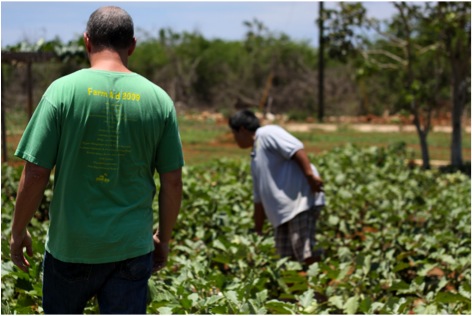By Alexander Britell
In just over three years in Miami, Chef Michael Schwartz has risen to the top of the culinary scene and won the top honor for any American chef, the James Beard Foundation award, last year for his namesake restaurant, Michael’s Genuine Food & Drink. Schwartz has now expanded his kitchen to the Camana Bay development in Grand Cayman, which opened last year and is managed by Chef Thomas Tennant, who is Michael’s chef on-island. The restaurant, like its Miami forebear, emphasizes locally-sourced produce, and changes its menus to incorporate what is seasonal and available locally. Schwartz talked to Caribbean Journal about bringing Miami to Cayman, the Caribbean slow food movement and a culinary solution for Cayman’s invasive lionfish problem.
How did you end up opening in Cayman?
It’s pretty simple, really. I was introduced to the folks at Camana Bay by a mutual friend, and they pursued us, because they wanted us to open for their project, the town center [in Grand Cayman]. So when we looked into it, we liked what we saw, we liked the people, the players, the island, and thought that here was an opportunity to really change the culture in terms of food and sourcing and local product, and the rest is history.
How different is operating a slow food restaurant in the Caribbean? Is there a slow food movement in the Caribbean?
There is. And there’s actually a Slow Food chapter in Grand Cayman. It’s pretty difficult. How difficult is it? I think there are enough people that live in Cayman, certainly expatriates, and enough tourists, that appreciate and look for that kind of approach, so it’s been very well received, but difficult to pull off. The product availability locally has gotten a lot better — but it’s still a tropical island.
Talk about your Farmer Exchange Programme.
The idea simply is that we work with a lot of growers here in Miami, and when we found people growing in Cayman, and to some extent struggling to get better results, the obvious solution to that was to bring some of the growers here down there, because the climate and growing conditions are very similar. So we got through that by bringing some people down that had more experience, to guide them. It kind of started that way, and they’ve been very receptive and some of them have come to visit farms in Miami.
How has the reception to the restaurant been so far?
I think it’s been very well received. It’s a different style of restaurant, and so it’s not what people typically expect when they go to a Caribbean island, so to that extent it’s been a little different — both for people getting used to what we do, and for us to get used to what people want and expect and trying, I wouldn’t say to change or tweak, but tweak it a little bit so it’s a little more approachable for somebody that’s in an island. But I think for the most part, the reception has been great, and there’s certainly enough people that appreciate what we’re doing and buy into that.
How would you describe the current state of Caribbean cuisine?
I think it’s very predictable and very typical — and that’s what it should be. It should be exactly what it is. But that doesn’t mean we can’t go to an island like that, and use typical ingredients or obvious ingredients in different ways to produce different results. So we’re not going to change what Caribbean cuisine is, but we can define it in our own way and our own style.
Cayman is the epicenter of a huge problem of invasive Lionfish. Can you talk about your unique solution the problem?
That [idea] is 100 percent Chef Thomas Tennant [Schwartz’ chef on-island]. He really embraced that movement, and you know, it’s interesting, because there’s not a ton of options with local product down there, so whenever there’s something, he’s the first one to grab onto it, and take the ball and run with it. It started last year when we first came to Cayman, when they had a lionfish tournament, so all the divers latched onto that, and I said, if you’re going to have a lionfish tournament, bring it to me and we’ll serve it for the Taste of Cayman [food festival]. So they wound up processing three or four hundred pounds of lionfish, and that kind of created a buzz. Now it’s a national story about lionfish and people working with it, but he’s doing a really good job. We also just created the “Lionfish Safari,” where we teamed up with a local dive shop and take groups of people to go out there and shoot the lionfish, gather them and then bring them back to the restaurant and eat them after for dinner. And that’s been really well received, so there’s a light buzz going on about lionfish. Lots of guests come and inquire about it and are excited to try it.
Have you thought about bringing it to Miami?
I don’t know. People ask us that all the time, so I know they’re out there, but I think we’re working on that.
Above: Chef Schwartz on a farm in Cayman.

